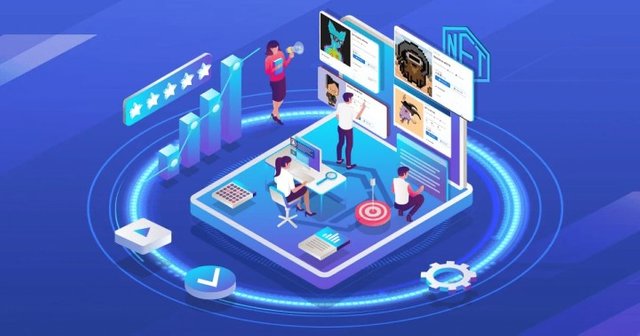
In the dynamic landscape of blockchain technology, Non-Fungible Tokens (NFTs) have emerged as a revolutionary concept, transforming the way we perceive and exchange digital assets. NFT Marketplace Development is at the forefront of this paradigm shift, driving innovation and creating new opportunities in the digital realm. Let's delve into the key aspects of NFT Marketplace Development in 2024.
An Insight into NFT Marketplace Development
NFT Marketplace Development involves the creation of online platforms that facilitate the buying, selling, and trading of NFTs. These marketplaces leverage blockchain technology to ensure the uniqueness, authenticity, and ownership of digital assets. In 2024, this industry is poised for unprecedented growth, offering exciting prospects for developers, investors, and enthusiasts alike.
Understanding the Dynamics of NFT Marketplace Development
To comprehend the intricacies of NFT Marketplace Development, it's crucial to recognize the underlying technologies. Blockchain, the decentralized ledger, plays a pivotal role in securing transactions and ensuring transparency. Smart contracts, self-executing contracts with the terms of the agreement directly written into code, automate processes, enhancing the efficiency of NFT transactions.
Advantages of Engaging in NFT Marketplace Development
1. Global Reach and Accessibility
The decentralized nature of NFT marketplaces ensures a global reach, allowing artists and creators worldwide to showcase their work. This decentralized model eliminates geographical barriers, expanding the audience and potential sales.
2. Immutable Ownership and Authenticity
NFTs are recorded on the blockchain, providing an immutable record of ownership. This not only verifies the authenticity of digital assets but also prevents unauthorized duplication, instilling trust among buyers and sellers.
3. Decentralization and Security
Decentralized storage and distribution of NFTs make them resistant to censorship and hacking attempts. Blockchain's cryptographic principles ensure a secure environment, reducing the risk of fraud or unauthorized access.
4. Smart Contract Automation
Smart contracts automate various processes, including royalty distribution to creators. This eliminates intermediaries, reducing costs and ensuring that creators receive their fair share of revenue directly and instantly.
5. Diversification of Digital Assets
NFT marketplaces are not limited to digital art; they encompass a wide range of digital assets, including music, videos, virtual real estate, and more. This diversification attracts a broader audience and opens up new possibilities for creators.
How to Initiate NFT Marketplace Development
Embarking on NFT Marketplace Development requires a systematic approach. Here are key steps to guide developers and entrepreneurs in the process:
1. Market Research and Analysis
Before commencing development, thorough market research is essential. Identify target audiences, analyze competitors, and understand the trends and demands within the NFT space.
2. Blockchain Selection
Choose a suitable blockchain network for your NFT marketplace. Ethereum remains a popular choice, but other networks like Binance Smart Chain and Flow are gaining traction. Consider factors such as scalability, transaction fees, and community support.
3. Smart Contract Development
Develop smart contracts that define the rules of your NFT marketplace. This includes details on ownership, transferability, and any additional functionalities specific to your platform.
4. User-friendly Interface
Design an intuitive and user-friendly interface for your marketplace. Simplify the onboarding process for both creators and buyers to encourage participation.
5. Security Measures
Implement robust security measures to safeguard user data and digital assets. Conduct regular audits and updates to stay ahead of potential vulnerabilities.
Hiring a Professional NFT Marketplace Development Team
Building a successful NFT marketplace requires expertise in blockchain development, smart contract programming, and user experience design. Hiring a skilled development team is crucial for a seamless and secure platform. Consider the following factors when selecting a development team:
1. Experience in Blockchain Development
Look for a team with a proven track record in blockchain development, particularly in NFT marketplace projects.
2. Understanding of Smart Contracts
The development team should have a deep understanding of smart contracts and their integration into NFT marketplaces.
3. User Interface Design Expertise
A visually appealing and user-friendly interface is vital for attracting and retaining users. Ensure the team has expertise in UI/UX design.
4. Security Protocols
Security is paramount in NFT marketplaces. Verify that the development team implements robust security protocols to protect user data and assets.
5. Scalability Solutions
As the user base grows, scalability becomes crucial. Choose a team that can implement scalable solutions to accommodate increased traffic and transactions.
The Significance of Smart Contracts in NFT Marketplace Development
Smart contracts are the backbone of NFT marketplaces, providing automation, transparency, and trust. Understanding their importance is fundamental for developers and users alike:
1. Automated Transactions
Smart contracts automate the entire lifecycle of an NFT, from creation to sale and transfer. This automation ensures efficiency and eliminates the need for intermediaries.
2. Transparent Royalty Distribution
Creators receive automatic and transparent royalty payments through smart contracts. This feature ensures that artists are fairly compensated for the use and resale of their digital assets.
3. Immutable Ownership Records
Smart contracts on the blockchain create immutable records of ownership, eliminating disputes and establishing clear ownership history for each NFT.
4. Decentralized Governance
Some NFT marketplaces leverage smart contracts for decentralized governance, allowing users to participate in decision-making processes related to platform upgrades and changes.
5. Conditional Operations
Smart contracts enable the implementation of conditional operations, such as unlocking additional content or features based on predefined criteria, adding dynamic functionalities to NFTs.
NFT Marketplace Development Cost
The cost of NFT Marketplace Development varies based on several factors, including the complexity of the project, chosen blockchain, features, and development team rates. On average, development costs can range from tens of thousands to hundreds of thousands of dollars. It's essential to consider ongoing maintenance and security costs in the overall budget.
Conclusion
In 2024, NFT Marketplace Development stands at the forefront of technological innovation, offering a decentralized and transparent platform for creators and buyers. The benefits of global reach, security, and automation provided by smart contracts make NFT marketplaces a powerful force in the digital landscape. As the industry continues to evolve, staying informed about the latest trends and technologies is key to thriving in the dynamic world of NFTs.